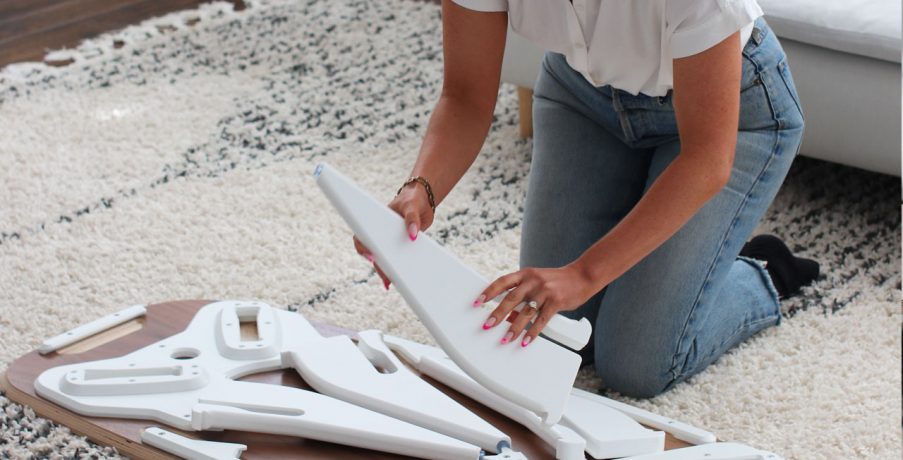
Neil A. Carousso produces NewsNation original “Kurt’s Country” – a celebration of country music and a slice of Americana with host Kurt Bardella.
-
Small DIY Home Furniture Business Turns to Organic Social Media Content to Elevate Engagement
Posted by: Neil A. CaroussoPost Views: 545By Joe Connolly and Neil A. Carousso
NEW YORK (WCBS 880) — Digital advertisements were a slam dunk for businesses during the COVID-19 pandemic, but recent changes to Facebook and Instagram’s algorithms have made it difficult to break through and expensive to generate sales. A Brooklyn home furniture company found a strategy that works for their business.
Hoek Home creates modular, quick assembly desks, tables and stools from their factory in Brooklyn. Brian Chu and Conor Coghlan started the business after hearing from family and friends about how difficult it was to set up and move furniture.
“It’s not really about an aesthetic for us. It’s more about a system and simplifying people’s lives,” said Coghlan on the WCBS Small Business Spotlight, sponsored by Dime Community Bank.
Coghlan and Chu met while studying architecture at the Harvard Graduate School of Design. They reconnected years later to start their own design and fabrication firm, A05 Studio and later Hoek Home.
Initially, Hoek Home got a sales boost by promoting their home office videos on Facebook and Instagram. Within the last few months, their customer acquisition costs have skyrocketed. Now, they rely on user-generated content.
“We would ask our customers to send videos of themselves assembling the desk and share it on their story. So essentially what we’re trying to do is advertise through word-of-mouth,” Chu said.
They’ve also partnered with micro-influencers to promote their furniture on social media.
“We’ve gained quite a following through some partners that we work with, some advisors that have really helped us out,” said Chu.
Hoek’s Home Office Desk sells for $495 on their website and accounts for 60-70% of their sales.
“It really offers a huge amount of value to have your desk set up during the week, and then, say you’re having friends over for dinner, you’re having a party on the weekend, and you just need that extra space, you just click it back together. You can hang it on the wall, you can slide it under your bed,” Coghlan said.
Coghlan and Chu say listening to customers’ feedback has helped them grow. They even have a whiteboard in their factory with a list of what they call “expanded ideas.”
“We actually have outreach to our customers to hear what their experiences are with the furniture that they have so we can take their comments and really try to fine-tune and tweak certain portions of our design to to come up with a new product or a new feature or just make the product better,” said Chu.
See growth ideas on the Small Business Spotlight video above.
-
Bronx Fashion Entrepreneur Inspires Disadvantaged Youth
Posted by: Neil A. CaroussoPost Views: 510By Joe Connolly and Neil A. Carousso
NEW YORK (WCBS 880) — Flora Montes overcame a broken home to become an entrepreneur and mother.
She found purpose by cooking for corporations in the Bronx after culinary school and developed a network. She later got hooked on fashion after attending Latin Fashion Week in 2012 and launched her own fashion business, Bronx Fashion Week, two years later.
“Fashion should never just be defined to, you know, six foot tall, size two. So that’s the main mission of Bronx Fashion Week,” said Montes on the WCBS Small Business Spotlight, sponsored by Dime Community Bank.
Bronx Fashion Week has more events each year than New York Fashion Week and attracts more than a thousand attendees. It highlights local designers and models and benefits non-profit organizations with which they partner.
“One thing I’ve learned is that fashion is more than fabric and there’s a story behind every stitch and we’re built on those stories.”
Montes recently expanded to serve schools in the South Bronx, and the response has been overwhelming.
“They actually came to me and told me that they had gone to the principal and told the principal that we had to come back,” she said. “We teach them fashion history, we’re teaching them the runway, we’re teaching them the behind the scenes of how a fashion house runs.”
The fashion CEO believes future leaders are in those classrooms and hopes to inspire kids to pursue their career dreams despite disadvantages they might face in their upbringings.
“For me, the fashion part of it is about the inclusivity and the diversity. And, fashion is in everything, In everything we do. You can wear a pair of pajamas like I tell my students and you’re wearing something that is defining who you are,” said Montes.
See this uplifting and inspiring story on the Small Business Spotlight video above.
-
Local Business Leader: NYC Should be the ‘Best Place in America to Work from Home’
Posted by: Neil A. CaroussoPost Views: 632By Joe Connolly and Neil A. Carousso
NEW YORK (WCBS 880) — Manhattan’s economy has changed drastically in the three years since the COVID-19 pandemic uprooted New York. Still, not much has been done to address the new needs of residents and workers.
Office occupancy remains below 50% and only a small percentage of those who have returned are working in-person five days a week. As a result, businesses that once thrived in office districts are struggling if they even survived the pandemic.
“I think we should make New York the best place in America, if not the world, to work from home,” said Jonathan Bowles, executive director of the Center for an Urban Future, on the WCBS Small Business Spotlight, sponsored by Dime Community Bank.
“That’s gotta be part of the strategy and certainly converting some of those office buildings, the ones that allow it for residential, it should happen. We’ve got to accelerate and expedite it,” he added.
Conversions to residential use have stalled due to government red tape. Bowles believes creating more of a residential borough will create more demand for the kinds of goods and services that small businesses are selling in those districts.
“Manhattan, certainly, is one borough where we’ve really seen the aging of the population, and so that’s led to kind of more doctor’s offices, healthcare offices, other things that I think are catering to an older population and we may see more of that going forward,” the business leader said.
The Center for an Urban Future is also reporting on many opportunities for small businesses to service non-profits who work in disadvantaged communities and launch technology companies in markets that have not been addressed such as “women and family tech” in which women are the main consumers.
“New York has a chance to be a real leader nationally or globally in that sub-sector of technology,” Bowles said. “E-learning is another area where New York has seen a real growth in local startups. There’s just so many different facets of tech that are still strong here and I think that that is going to continue to drive a lot of spending on small businesses and also kind of drive employment growth in the city.”
See ideas for new businesses and new markets on the WCBS Small Business Spotlight video above.
-
In 2023, Businesses Face Changing Sales Landscape, Arrival of New Technologies
Posted by: Neil A. CaroussoPost Views: 484By Joe Connolly and Neil A. Carousso
NEW YORK (WCBS 880) — The only constant in business is change.
Businesses are beginning the year with the damaging impacts of high inflation and lingering COVID-19 supply chain woes after mixed holiday results.
Bill Aulet, Ethernet Inventors Professor of the Practice at the MIT Sloan School of Management and Managing Director of the Martin Trust Center for MIT Entrepreneurship, said business owners should brace themselves for new challenges.
“The biggest thing for business people.. is understand change,” Aulet said on the WCBS Small Business Spotlight, sponsored by Dime Community Bank.
“When you see something new, sit down, talk to your kids, talk to somebody else and say, ‘How does this affect my business?’ And do it before the other people do it. Use change as a competitive advantage for you because you have the right mentality. You don’t fear change. You embrace change.”
In a speech once, the former IBM executive told an audience that business owners must have the “mindset of a pirate and the skillset of a Navy SEAL.” In 2023, that means learning and accepting new technologies.
Most business owners, Aulet said, can no longer deny the use of artificial intelligence just like they had to embrace payment processing software and spreadsheets. Those that didn’t are no longer in business.
“I have a son who’s based in Brooklyn, started a company, he’s doing millions and millions of dollars the first year. I said, ‘How many salespeople do you have?’ He said, ‘None.’ Why? Because they’re using technology to do that now.”
He said AI is the future for sales because it will lower customer acquisition costs.
“What happens over society is you change to new jobs. You change the customer success jobs,” said Aulet on whether AI replacing salespeople is bad for the economy.
The new types of businesses being started by young entrepreneurs are not necessarily technology companies, though.
“They’re actually solving the problem of how do we identify when COVID or Zika virus, or now, polio shows up in a city in a region with a company like Biobot Analytics,” the MIT Entrepreneurship head said. “That’s the kind of stuff that young people are starting, and it gives me great hope because we as a society face great challenges.”
Watch the full conversation with Bill Aulet on the WCBS Small Business Spotlight video above.
-
Less is More: How to Scale Your Business in the New Year
Posted by: Neil A. CaroussoPost Views: 525By Joe Connolly and Neil A. Carousso
NEW YORK (WCBS 880) — Sometimes, less is more.
Jessica Spaulding, the co-founder of Harlem Chocolate Factory, learned that principle over the last seven years in business. It helped her grow the chocolatier from a small shop into a national brand.
Jessica always loved chocolate, and as a kid, it was the only sugary item allowed in her mother’s house. She went on to pursue the chocolate business while studying at Spelman College in Atlanta, GA.
“I took one semester, I took my refund check and started a chocolate company. No business plan, no sales strategy. My thought was I was just going to give away a bunch of chocolate and people were going to fall in love with it and just order it for me,” she said on the WCBS Small Business Spotlight, sponsored by Dime Community Bank.
The original business fizzled and was the first important lesson in Spaulding’s journey. Over the next several years, the chocolate-lover finished her education and learned marketing and supply chain management along the way. In 2015, she revived her dream business and opened a shop in Harlem where she was born and raised.
“When I really literally felt like I had nothing else, I was like, alright, why don’t we go back to the drawing board about this chocolate thing that I wanted, like I’ve always wanted to do, and that’s when I finally started,” said Spaulding.
Harlem Chocolate Factory quickly developed product after product. At one point, it sold 45 different chocolate products. When the pandemic hit, Spaulding realized that in order to scale, she needed to do more with less.
“It may feel like a lot to have 10 customers in your face like, ‘Where’s that product I really love?’ But when you look on the paper and you’re looking over the past like four or five years and realizing, okay, we’ve only sold $3,000 worth of this product… We were able to create an equation for how we keep products, and I think that that is probably the most valuable thing that could have ever happened to us.”
Supply chain issues forced Spaulding to innovate her packaging. She eventually found a supplier that could handle volume at scale, which helped her improve her margins.
“We used to order like stock packaging because we could just, one, between space and money, we could never just buy a shipping container worth of packaging to last us for the whole year,” she said. “So, we have to find a packaging that is good enough to kind of like display all of our luxury elements and our premium elements while at the same time being affordable enough to not put us out of business every quarter when we need to do reorders.”
Spaulding told WCBS 880 she spent years learning about different types of packaging and how it impacts sales and the quality of chocolate.
She also turned to Intuit QuickBooks to manage her business’ accounting and payroll.
“We took a real hit to our business due to supply chain and inflation, and QuickBooks’ various features and tools enable us to accurately track all of our finances and create a better path forward,” Spaulding said.
Despite being in a crowded field, the quality of Harlem Chocolate Factory stood out to several hotels that contacted the business.
“It’s always something we wanted to do, but we never felt like we were in a place operationally to handle it,” she admitted.
After performing well with the first hotel, others started calling.
“When you service one person and it goes really well, they likely have a colleague that may not be in the same business as them, but within the same industry and they will tell them about your business,” Spaulding said.
While she believes word-of-mouth has been the most effective marketing tool for Harlem Chocolate Factory, she often brings three team members to trade shows, which she grew up attending with her mother.
“One person’s there for education, one person’s there for sales, one person’s there for partnerships,” Spaudling explained, adding, “Each person has a specific task, they’re given a task, and that entire day, that’s the only task you do because it can be completely overwhelming.”
Her advice is to focus on genuine connections rather than exchanging business cards with a large quantity of people.
You can see more marketing and sales lessons and advice on the Small Business Spotlight video above.











